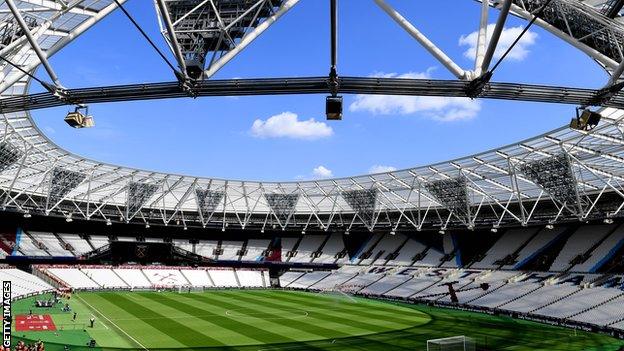West Ham: London Stadium rent 'does not even cover cost of matches', owners say
- Published

West Ham pay an annual rent of £2.5m
West Ham's rent at their London Stadium "does not even cover cost of staging matches", the ground's owners say.
Lyn Garner, London Legacy Development Corporation chief executive, also said "high operating costs" and "a lack of commercialisation" meant they were facing "losses for the next 97 years".
West Ham have paid an annual rent of £2.5m since moving in in August 2016.
The stadium, built for the London Olympics in 2012, has been dogged by controversy over its finances.
In July, it was revealed £450,000 of taxpayers' money had been spent on unsuccessfully searching for a sponsor for the venue, which cost £323m to convert into a football ground after an original estimate of £190m.
It was planned that any sponsorship would offset some of the £140m losses expected over the next 10 years.
Garner told a London Assembly meeting that the cost of moving seats for events was also a factor in why taxpayers were having to subsidise the stadium - though that cost had come down from £11m to £4m this year.
But she continued: "To be honest, what is really driving the problems here are the low rents paid by the concessionaires, particularly West Ham.
"The elephant in the room is the fee that they pay us in a usage cost does not cover the event-day costs, and that's before we go anywhere near a commercial advantage. It simply does not cover the costs of running the events on a day-to-day basis.
"The stadium is a centrepiece of the legacy of the Queen Elizabeth Olympic Park. It's really important that we tackle the public subsidy issue over the next few years. There is much to do and many reasons for it."
West Ham told BBC Sport they had offered to help the LLDC identify commercial opportunities and had only ever honoured the terms of their tenancy agreement.
The verdict on West Ham’s stadium move
'300k is a drop in the ocean'
Garner also said the group had decided to reject West Ham's offer to pay £300,000 to change the colour of the running track around the ground, from green to claret.
She said it was rejected for a variety of reasons, including the fact "it could affect potential naming rights" deals, adding that they were in discussions over charging an annual commercial fee of "around £300,000" instead.
"The usage fee is extremely low," she added. "We could take the £300k. It's a drop in the ocean for the size of the losses we are dealing with and will be dealing with for the next 97 years of this contract.
"But it's not unreasonable to ask the club to pay something extra for something they are getting back which is extra."
Meanwhile LLDC chairman Sir Peter Hendy told assembly members that it was wrong to suggest the stadium was not suitable for football - one of the reasons that has been put forward by some looking to explain the club's recent on-pitch struggles as they sit bottom of the Premier League.
He cited recent quotes from manager Manuel Pellegrini in which he said: "The pitch has the same measurements. The grass is in very good shape. The atmosphere with 55,000 people is great. The stadium is not an excuse."
West Ham respond
"West Ham United initially offered to purchase London Stadium but our request was denied. We were given a tenancy agreement because we were the best offer by far on the table," a club spokesman said.
"As LLDC acknowledged at the hearing today the losses at the stadium are due to a number of factors, including the extraordinary cost of moving the retractable seating, inefficient operating costs and the absence of a naming rights partner.
"There are other commercial opportunities that they have ignored. West Ham United have offered our experience, expertise and opportunities for shared endeavour every step of the way but these have so far been rejected, as well as considerable cash for additional rights, all of which have also been rejected.
"All we have ever done is honour the terms of our tenancy agreement which has 97 years to run."